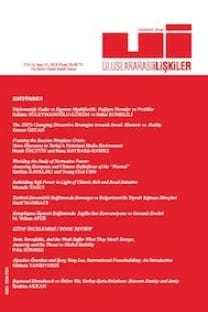Irak Savaşı bir 'Saldırı Suçu' mudur? İngiltere Lordlar Kamarası'nın bir Kararı
Bu makale İngiltere'deki savaş karşıtı grupların İngiltere hükümetinin Irak Savaşı'na katılımını protesto için düzenledikleri gösteriler nedeniyle gerçekleştirdikleri sivil itaatsizlik eylemleriyle ilgili olarak İngiltere'nin en yüksek mahkemesi sayılan Lordlar Kamarası'nın Şubat 2006 tarihinde vermiş olduğu kararı konu ediniyor. Sivil itaatsizlik suçu bazı askeri bölgelere izinsiz olarak girmek ve bu üslerdeki kamu mallarına zarar vermek şeklinde gerçekleşmiştir. Savunma makamı, mahkemeden, işlenen suçun İngiltere hükümetinin işlemekte olacağı daha önemli bir suçu, “saldırı suçu”nu önleme amacıyla gerçekleştirilmesi nedeniyle İngiltere ceza hukukundaki “zaruret hali” savunmasından yararlanma talebinde bulunmuştur. Lordlar Kamarası verdiği kararda saldırı suçunun uluslararası teamül (yapılageliş) hukukuna göre bir suç olduğunu kabul etmiş, ancak İngiltere hükümetinin Irak Savaşı'na katılma kararının yasallığını veya savaşın bir saldırı suçu sayılabileceği konusundaki irdelemeyi reddetmiştir. Hukuk Lordları'na gore, böyle bir karar, mahkemelerin değil, sadece Parlamento'nun yetkisi dahilindedir.
Anahtar Kelimeler:
Uluslararası Ceza Hukuku, Güç Kullanımı, Saldırı Suçu veya Barışa Karşı Suç, Nürnberg Savunması, Sivil İtaatsizlik.
Does the War Against Iraq Constitute a "Crime of Aggression"? A Ruling of the House of Lords
This article analyzes a decision of' House of Lords (February, 2006), the United Kingdom's highest court, concerned with anti-war demonstrations objecting on the basis of international law to British participation in the Iraq war. This "civil disobedience" case alleged that the accused had unlawfully caused damage at military bases in England, as well as unlawfully trespassing on government property. The defendants asked the Law Lords to decide whether they should be allowed a necessity defense acknowledging the commission of a lesser crime as necessary to prevent the government of the United Kingdom (UK) from committing what they regarded as a far greater crime, a "crime of aggression. " The House of Lords decided that the crime of aggression is an international crime that is part of customary international law, but they refused to assess the legality of the decision by the UK government to launch the war, or to decide whether the war constituted a "crime against peace or war of aggression. " 'The Law Lords concluded that such questions were not for the courts to determine unless directed to do so by an act of Parliament.
Keywords:
International Criminal Law, Aggression or Crimes Against Peace, Nuremberg Defense, Civil Disobedience, Use of Force,
___
- ....
- ISSN: 1304-7310
- Başlangıç: 2004
- Yayıncı: Uluslararası İlişkiler Konseyi Derneği İktisadi İşletmesi
Sayıdaki Diğer Makaleler
Muhteşem Ortaklık: Kant ve Clausewitz
Asimetrik Saldırı Savaşları, Siyaset ve Uluslararası Hukuk
Terör ve Devlet Terörizmi Çağında Savaş ve Barış
Rousseau'nun Savaş ve Barış Kuramı: Adalet Olarak Barış
Irak Savaşı bir 'Saldırı Suçu' mudur? İngiltere Lordlar Kamarası'nın bir Kararı
